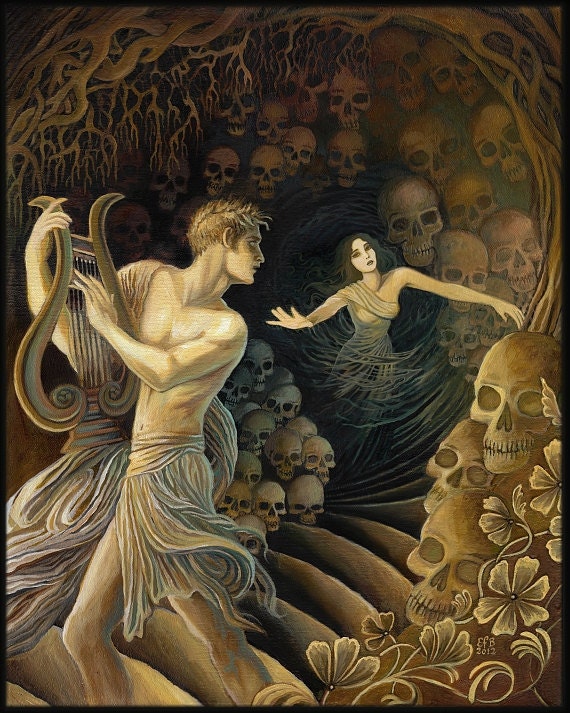Love, Loss, Passion, and Despair.
 The plot line is that Orpheus is the musically-gifted son of Apollo. He falls in love with Eurydice, a wood nymph, and they become inseparable. Unfortunately, Eurydice gets bitten by a venomous snake and is sent to the Underworld. Orpheus loves her so much though that he goes down to find her, even though the living aren't technically allowed in the Underworld. Orpheus plays his lyre and sings, and everyone in the Underworld, including Hades and Persephone, are so moved that Hades makes a deal with him that if he walks out of the Underworld without looking at Eurydice walking behind him once, then they can return to the world of the living together. If he looks back at her before they leave, then she'll be eternally banished from him. Of course, he looks back too early (Orpheus had stepped out of the underworld, but Eurydice was still just inside the gates to the Underworld -if he'd only just waited 30 more seconds), and Eurydice is once again lost.
The plot line is that Orpheus is the musically-gifted son of Apollo. He falls in love with Eurydice, a wood nymph, and they become inseparable. Unfortunately, Eurydice gets bitten by a venomous snake and is sent to the Underworld. Orpheus loves her so much though that he goes down to find her, even though the living aren't technically allowed in the Underworld. Orpheus plays his lyre and sings, and everyone in the Underworld, including Hades and Persephone, are so moved that Hades makes a deal with him that if he walks out of the Underworld without looking at Eurydice walking behind him once, then they can return to the world of the living together. If he looks back at her before they leave, then she'll be eternally banished from him. Of course, he looks back too early (Orpheus had stepped out of the underworld, but Eurydice was still just inside the gates to the Underworld -if he'd only just waited 30 more seconds), and Eurydice is once again lost.The theatre company that's putting on this production decided to use a different method to tell the story onstage, and make it more abstract. Most of the play tells the story through movement and music. We've also incorporated our own experiences with love, and as the performance progresses, we switch back and forth between transitioning through all aspects of a relationship, and paralleling it with what's happening in the story. I'll have to say that I was skeptical before I joined. It was the sort of thing that sounded like it was trying to be insightful and deep, but was really nonsense. I've since realized that this play has higher standards.
I joined the play later than most people, so I didn't help create any of the scenes. Here are a few points that I've observed about the play though:
- I think there's some scenes that we could cut out. I'm in the play, and even I don't understand what some small scenes are trying to portray/how they're advancing the plot. The movements in them have no value.
- I think our play is incredibly emotionally moving. There's this one scene where, in order to portray Orpheus as trying to overcome the obstacles that Hades sets in place between him and Eurydice, we have one person as Eurydice slowly walk all over the stage, while the cast lines up, one by one behind her, our bodies contorted in different positions connecting to each other. One person, playing Orpheus, crawls over and under us in an attempt to catch up with Eurydice, and he desperately calls out her name. He's never able to reach her though, because the person at the end of our human "obstacle" always runs to join the other end, near Eurydice, and it seems that Orpheus is eternally having to overcome these obstacles. This scene is so creative and visually-aesthetic, and there's such a strong sense of desperation created from Orpheus, and the energy created from the rapidity in everyone except Eurydice's movements.

If you're at all curious about this show, we'll be performing the first week of June.



Aw, I love Greek mythology. This one is so sad and heartbreaking.
ReplyDeleteDo the plays that you are involved in usually base it on a story? Or are a lot of them made up?
I've heard this story before. Does Orpheus not open a new passage into the underworld through the playing of his lyre?
ReplyDeleteI think it would be interesting to see though, for I find most plays like this either turn out really well, or not so well. I'm sure yours will be great though!
This was a childhood story for me, and I love seeing that it's still alive and well. Although I've never been one for the whole concept of abstract theatre, that scene you describe at the end seems very moving. I'll have to come check it out
ReplyDelete